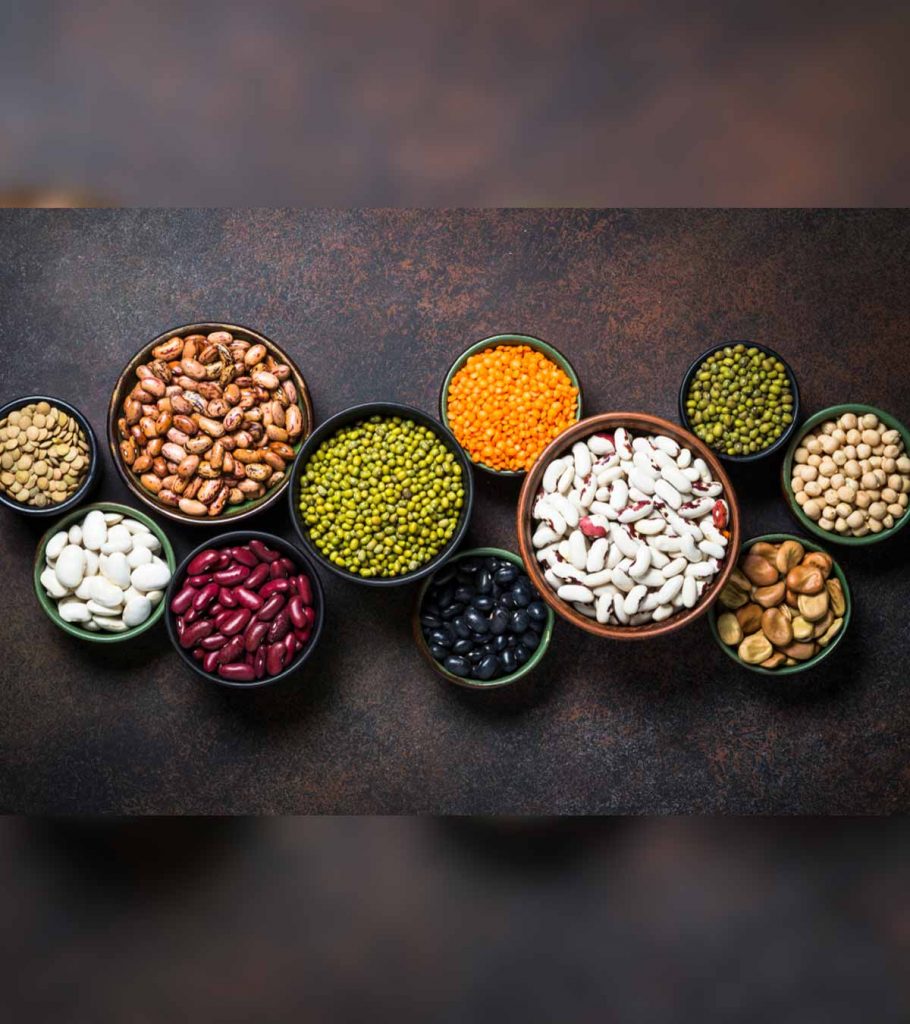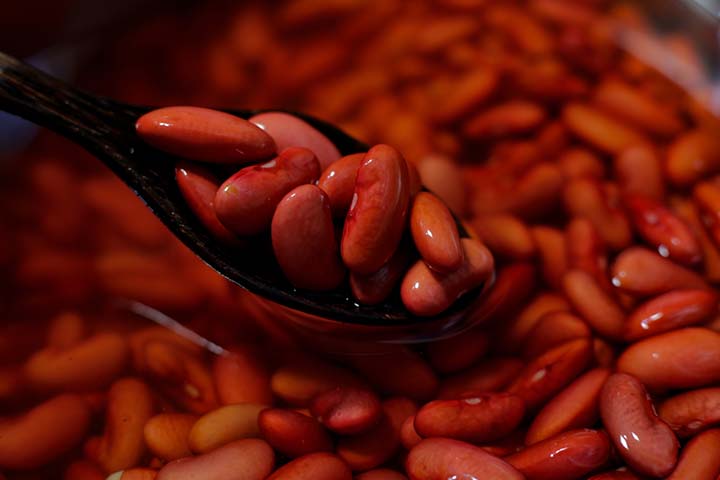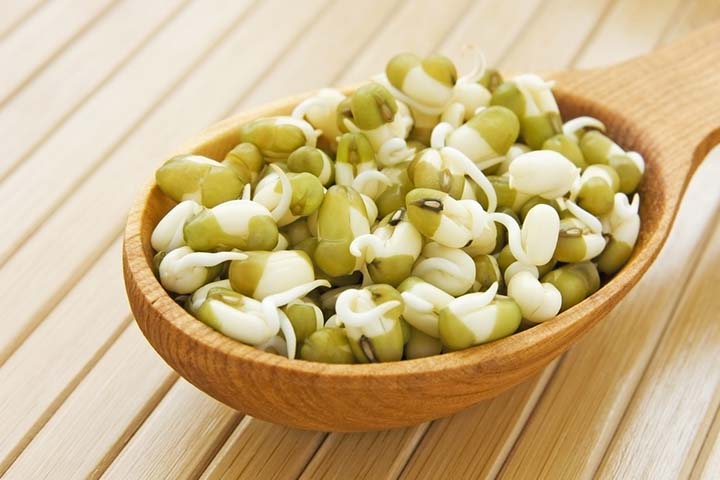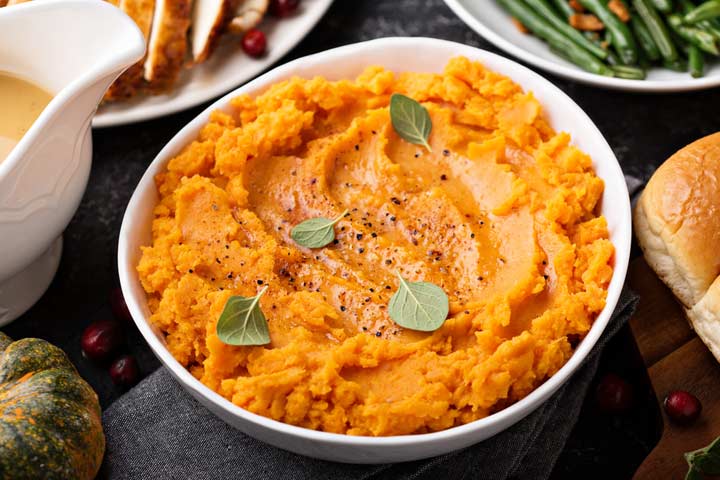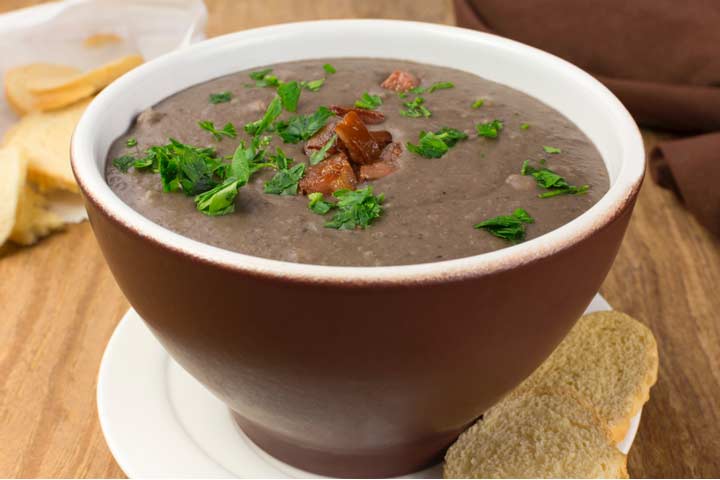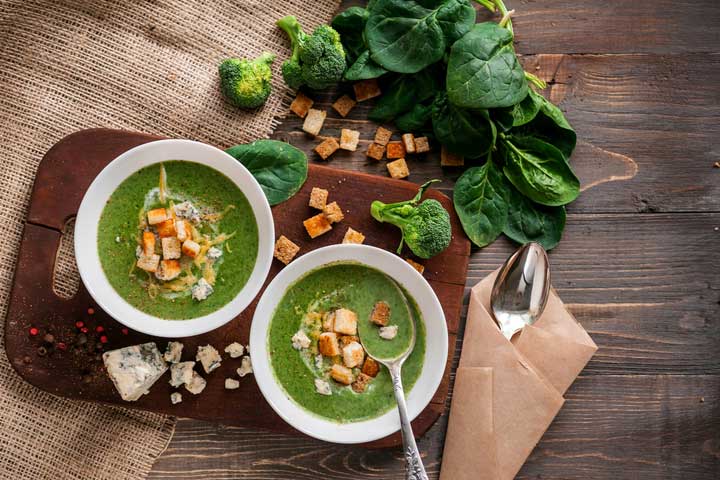Beans for babies are a good choice due to various reasons, including their high nutritional content and since they can be easily included in their diet. Beans are leguminous plant seeds with a distinct nutritional profile and bioactive qualities, making them a crucial component of a healthy diet. However, bean consumption is frequently associated with flatulenceiXRelease of gas from the rectal region, commonly known as farting.and gas and may be difficult for a baby’s digestive tract to handle.
Read on to know about beans, including their health advantages for babies, their negative effects, and age-appropriate ways to incorporate them into the diet.
When To Introduce Beans To Babies?
Beans can be added to a baby’s diet from the age of six to seven months, when they begin consuming solids (1) (2). The protein and iron-rich foods can be a valuable addition to your baby’s weaning diet as it gets more difficult for babies to get all the nourishment they need from milk alone. Moreover, at this age most babies are able to handle food compositions that are different from those of milk or formula.
Gastrointestinal issues, like flatulence, may occur in sensitive infants during the first few times of consuming beans. However, it should not be a concern if the baby is healthy and not in any discomfort. Soaking beans for at least four hours before cooking (3) and feeding in small quantities may help reduce flatulence. Methods like soaking, cooking, and sprouting decrease antinutrients in beans to a considerable extent.
Sumiko, a mother to a beautiful baby girl, April, shares her experience about using beans to introduce texture to her baby’s food. She says, “The first chunky thing I fed April was fat-free refried beans. These are my normal refried beans that I feed the rest of my family. She absolutely loved them and didn’t even seem to notice that there were little chunks of bean (i).”
Which Beans Are Good For Babies?
Some common dry beans considered suitable for babies are black beans, white beans, kidney beans, pinto beans, fava beans, cannellini beans, mature lima beans, and chickpeas or garbanzo beans (4). Some varieties like soybeans are associated with some food allergies. You can begin feeding any type of beans but check for the suitability of the bean variety to your baby.
For infants, use simple preparations when introducing beans. You can feed well-cooked beans in an easy-to-digest, mashed/puree/soup form.You may mix them with a fruit or vegetable that your baby eats. Older babies and toddlers can consume well-cooked bean pieces as finger foods.
How Much Beans Can Babies Consume?
You can introduce one to two tablespoons of pureed beans once a day (1). Once the baby completes eight months, you can serve them two tablespoons of mashed beans a day. Toddlers older than 12 months can consume two tablespoons of cooked beans per serving, twice a day (5) (6). Increase the quantity gradually.
Nutritional Value Of Beans
In general, beans are a good source of protein, PUFAiXDietary fatty acids found in plant and animal-based foods beneficial for heart and human health., dietary fiber, and micronutrients like folate and iron (6). Below is the proximate composition of one cup of two common cooked beans with the recommended dietary allowance per day for each nutrient (7) (8) (9) (10) (11) (12).
| Name | Pinto beans | Garbanzo bean | RDA (7-12 months) |
|---|---|---|---|
| Energy(Kcal) | 245 | 269 | – |
| Carbohydrate, by difference(g) | 44.8 | 45 | – |
| Protein(g) | 15.4 | 14.5 | – |
| Fiber, total dietary(g) | 15.4 | 12.5 | – |
| Calcium, Ca(mg) | 78.7 | 80.4 | 270 |
| Iron, Fe(mg) | 3.57 | 4.74 | 10 |
| Magnesium, Mg(mg) | 85.5 | 78.7 | 60 |
| Phosphorus, P(mg) | 251 | 276 | 275(AI) |
| Potassium, K(mg) | 746 | 477 | 700 |
| Sodium, Na(mg) | 1.71 | 11.5 | 200 |
| Zinc, Zn(mg) | 1.68 | 2.51 | 3 |
| Folate, total(µg) | 294 | 282 | 80(AI) |
Source: U.S. Department of Agriculture, World Health Organization, and Oregon State University
*AI = Adequate intake
The nutrient composition of beans varies from one another. Hence, adding a variety of beans in the diet is the best way to ensure optimum nutrient intake.
Possible Health Benefits Of Beans For Babies
Beans could provide various health benefits when consumed with a well-balanced diet.
- Support nutritional needs: Beans contain a considerable amount of macronutrients and micronutrients that can support your infant’s development. Some of the important nutrients that beans can provide are folate, calcium, zinc, magnesium, potassium, and essential amino acid lysineiXAn amino acid involved in regulating calcium absorption, collagen formation, and several other functions in the body. (13). Good amount of protein helps in muscle growth of your baby. All these nutrients promote normal development and functioning of the vital organs.
- Promote digestive health: Beans are rich in dietary fiber and resistant starch. Dietary fiber adds bulk to the diet and helps maintain healthy bowel movement. And reduce chances of constipation. The resistant starch after fermentation in the large intestine exhibits prebiotic properties to support the gut bacteria (13) (14).
- Contribute to overall immunity: Beans contain significant amounts of protein and zinc that can support the immune system (15). Besides, they contain bioactive compoundsiXNatural components found in both plants, animals, and microbes that have therapeutic properties., like phenolic acidsiXOrganic compounds found in plant-based foods such as fruits, cereals, and vegetables. , flavonoidsiXA group of naturally-occurring antioxidant and anti-inflammatory compounds found in fruits and vegetables., and anthocyaninsiXNatural pigments found in plant-based foods that help in various body functions and possess therapeutic properties., exhibiting antifungal, anti-inflammatory, and immunomodulatoryiXA property of a substance to regulate immune system functions to combat diseases and infections. properties (16). Soybeans, being rich in vitamin C, strengthen the immune system and protect the baby from cold, cough, or flu. They also control free radicals thus building the overall health of your baby.
- Protect against chronic diseases: Consuming beans may be an effective strategy to tackle chronic diseases in babies. Like other legumes, beans are rich in bioactive phytochemical compounds that play a role in various metabolic and physiological processes, thus protecting the body against severe illnesses. They exhibit the potential to reduce obesity by promoting weight loss. Moreover, their positive impact on diabetes is notable, improving insulin sensitivity and blood sugar control. Additionally, studies have shown that beans have cardioprotective properties, and its regular consumption can help reduce the risk of cardiovascular diseases. Furthermore, incorporating beans into your baby’s diet may help combat cholesterol and inflammation (17).
Precautions To Take While Feeding Beans To Your Baby
Follow these simple precautionary measures to ensure the safe consumption of beans by babies and toddlers.
- Prefer high-quality, USDA-certified packaged organic dry beans from a reputed manufacturer and seller.
- Avoid canned beans as they tend to be high in sodium, additives, and preservatives. Rinsing canned beans with water could wash away the additives, but may also wash away some water-soluble nutrients.
- Presoak beans for fat least four hours before cooking. It will soften the outer skin making cooking and digestion easy. It may also reduce the antinutrients like phytic acid and lectins and non-digestible carbohydrates that cause gas and interfere with mineral absorption.
- GerminatingiXThe process in which a seed, spore, or bud begins growing. and roasting beans can also reduce their antinutrient and non-digestible carbohydrate content (18) (19).
- Avoid using softening agents, such as baking soda, to cook beans. It may help cook beans faster, but could expose your baby to excess sodium.
- Do not add acidic ingredients, such as tomatoes and vinegar, until beans are well-cooked. Acidic foods can slow down the cooking.
- Introduce beans in pureed form and gradually move to mashed versions. Once the baby turns into a toddler, you can serve cooked beans as finger food or foods that can be easily picked up by a spoon.
- Never serve cooked whole beans to babies since they can be a choking hazard. Once the baby begins consuming finger foods, you can serve well-cooked, soft, and chopped pieces of beans (20).
- Follow a three-day wait rule while introducing beans to a baby. Do not introduce any other new food during this period. Discontinue feeding beans if you observe signs indicating allergy or sensitivity.
- Feed beans in small quantities initially to avoid indigestion and gas due to its high fiber and protein content.
Ways To Include Beans In Your Baby And Toddler’s Diet
Here are some ways to add a variety of beans to your infant and toddler’s diet.
- You can feed mashed/pureed beans mixed with mashed/pureed baby cereal, grains, and vegetables in moderate amounts.
- Cereal made of roasted and germinated beans is an option for babies already consuming beans.
- Multi-bean soups with mashed vegetables are a good choice for both babies and toddlers. Also, pureed beans, like pinto and garbanzo beans, can work as soup thickeners.
- Tiny pieces of cooked/roasted beans can be served as finger food for older babies.
- Chopped home-baked beans added to recipes, like salads, stews, pasta, make a wholesome meal for toddlers.
- Pancakes made of white bean or red bean are yet another healthy option for toddlers.
- Hummus, a dip made of garbanzo beans, can be used as a spread or sauce to make sandwiches or rolls for older babies and toddlers.
- Add well-cooked and mashed beans to cooked pieces of meat, fish, poultry, or grains and cereals, like quinoa, buckwheat, etc., to intensify the meal’s overall nutritional value.
Flavorful and Healthy Bean Recipes For Babies And Toddlers
Beans can make wholesome recipes that your baby/ toddler would enjoy consuming. Below are some recipes that are worth a try.
1. Bean and sweet potato puree
Bean and sweet potato puree is a nutrient-rich recipe for babies older thansix months.
You will need:
- ½ cup white beans (well-cooked)
- 2tbsp navy beans (well-cooked)
- 1 small sweet potato (baked potato)
- 1tsp virgin olive oil
How to:
- Blend all the ingredients (except olive oil) in a blender or food processor until you get a smooth paste. Ensure no lumps are left.
- Heat olive oil in a flat pan and add the blended mix to it. Cook for 15 to 20 seconds and serve immediately.
- You can add other pureed/mashed vegetables, like carrots, pumpkin, green peas, green beans, and butternut squash.
2. Black bean soup
Black bean soup is nutrient-dense, packed with folate, potassium, vitamin B6, soulful, packed with flavor and appetizing recipe for babies aged eight months and older.
You will need:
- 1 cup black bean (well-cooked)
- 2 cups fresh vegetable broth
- ½ cup mashed carrots
- 1 onion (roughly chopped)
- 2 cloves garlic (mashed)
- 1tbsp cumin
- ¼ cup tofu (slices)
- 1tbsp cilantro (for garnish)
- 2tbsp sesame seeds oil
How to:
- Put all the ingredients in a large stockpot and cook on low flame for an hour or until vegetables look tender and beans turn mashable.
- Once done, remove the soup from the heat and let it come to room temperature.
- Blend the soup into a smooth puree, using an immersion blender. Ensure no lumps are left.
- Garnish with cilantro and serve immediately.
3. Kidney bean and spinach baby food
It is a delectable iron and protein-rich spinach baby food recipe for babies aged ten months and older.
You will need:
- 1 cup cherry tomatoes (chopped)
- 1/2 cup kidney beans (well-cooked)
- 1 cup fresh spinach (chopped)
- ¼ cup cheddar cheese
- 1tsp herb mix
- 1tbsp cilantro (finely chopped)
- 1tbsp sesame seeds oil
How to:
- Heat oil in a thick bottom pan, add cherry tomatoes and cook until they turn mushy.
- Add kidney beans and spinach, and cook for five minutes or until spinach wilts.
- Put the flame on low, cover the pan with a lid, and let the ingredients simmer for another five minutes.
- Switch off the flame and let the mixture cool to room temperature.
- Once cooled, blend the mixture to smooth puree, garnish with cheese and cilantro, and serve immediately.
Beans are a nutrient-dense ingredient that may be used to supplement your baby’s weaning diet. From six to seven months of age, at least one serving of beans for babies is suggested daily to ensure that your baby obtains all the health benefits. However, it can also produce flatulence in newborns, so soak them for at least four hours before cooking them and offer them to your baby in small amounts. Start with a single-ingredient bean mash/puree and move up to age-appropriate soups, stews, and multi-bean dishes. Also, when introducing beans to your baby, follow a three-day wait rule to ensure there are no adverse reactions.
Key Pointers
- Beans are an essential source of micronutrients for babies.
- White, kidney, and black beans, among others, are a few types that are considered safe for babies.
- Bean soup, sweet potato, and a few other recipes using beans for babies as you scroll down.
